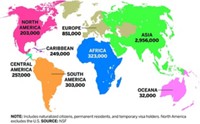Advertisement
Grab your lab coat. Let's get started
Welcome!
Welcome!
Create an account below to get 6 C&EN articles per month, receive newsletters and more - all free.
It seems this is your first time logging in online. Please enter the following information to continue.
As an ACS member you automatically get access to this site. All we need is few more details to create your reading experience.
Not you? Sign in with a different account.
Not you? Sign in with a different account.
ERROR 1
ERROR 1
ERROR 2
ERROR 2
ERROR 2
ERROR 2
ERROR 2
Password and Confirm password must match.
If you have an ACS member number, please enter it here so we can link this account to your membership. (optional)
ERROR 2
ACS values your privacy. By submitting your information, you are gaining access to C&EN and subscribing to our weekly newsletter. We use the information you provide to make your reading experience better, and we will never sell your data to third party members.
It has become an article of faith that the U.S. is falling behind in overall technical education and needs to produce more scientists and engineers relative to developing countries, particularly India and China.
I was shocked to contact my alma mater and discover that there had only been a handful of graduates in chemistry compared with the 25 or so when I graduated. Of the handful, even fewer were going into industry, preferring medicine, academics, or other nonindustrial fields.
Then again, it may not be so surprising when one considers the following: The U.S. chemical industry is steadily shrinking, having gone from a net exporter to a net importer in the space of a decade or less. The industry structure is being hollowed out, with few new jobs entering the picture, and many leaving forever.
After enjoying rigorous training underwritten by grants in the U.S., foreign-born graduates typically land jobs in the U.S. for a few years and then return to their home countries to compete with us.
Employers here decry the lack of sufficient numbers of talented scientists, but then offshore basic manufacturing and research for short-term economic gain and long-term industry loss. In this cycle, the future for chemistry and other technical graduates in the U.S. seems at best uncertain.
Welcome to the global economy! Apart from the passion and love many of us have for chemistry, the economic realities of the foreseeable future are driving many of us to consider options far from the plant or bench, because these are in obvious decline. How is the U.S. to defend its technical base and talent, or are we merely accepting the new order?
Paul Munger
Rockford, Ill.







Join the conversation
Contact the reporter
Submit a Letter to the Editor for publication
Engage with us on Twitter